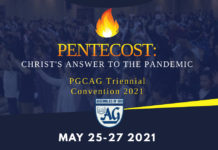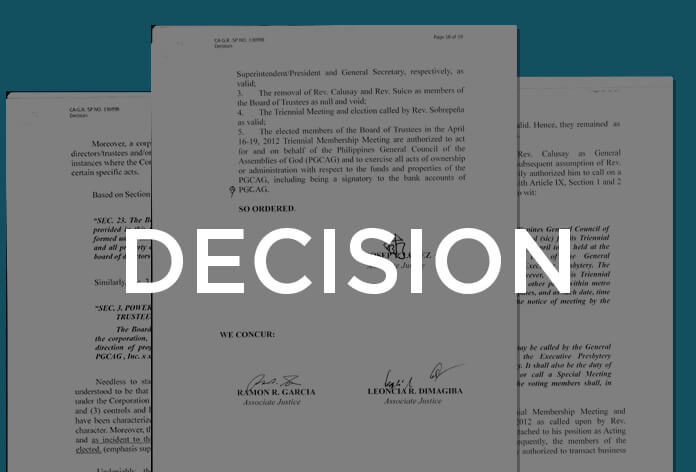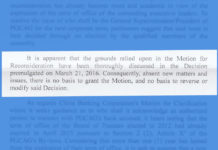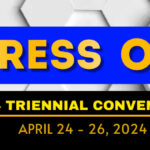Republic of the Philippines
Court of Appeals
Manila
Fifteenth Division
PHILIPPINES GENERAL COUNCIL OF THE ASSEMBLIES OF GOD, INC., REPRESENTED BY REV. DR. DAVID A SOBREPENA AND REV, CONRADO P. LUMAHAN, AND IN THEIR OWN BEHALF, Petitioners,
Versus
REV. REYNALDO CALUSAY AND REV. JOSEPH ROMMEL SUICO, Respondents
CA- G.R. SP No. 136998
Members:
Garcia, Chairperson,
Dimagiba, and
Lopez, JJ[1]
Promulgated: March 21, 2016
D E C I S I O N
LOPEZ, J.:
This is a Petition for Review under Rule 43[2] of the Revised Rules of Court with prayer for the issuance of a temporary restraining order seeking to set aside the Decision[3] dated July 28, 20134 of the Regional Trial Court of Valenzuela City, Bulacan, Branch 75, which declared null and void, among others, the removal of Rev. Calusay and Rev. Suico, the lifting of suspension of Rev. Sobrepena and his subsequent assumption as Acting General Superintendent/Pr3esident, and the convocation of the Triennial Meeting and the election resulting thereto, prompted by an Interpleaders Case filed by China Banking Corporation docketed as Civil Case No. 239-V-11 and the Intra-Corporate Dispute filed by Rev. Reynaldo Calusay and Rev. Joseph Rommel Suico. Docketed as Civil Case No. 7-V-12.
The facts as summarized by the court a quo:
“On August 12, 2010, Rev. Joseph Suico, General Secretary of the PGCAG wrote Rev. David A. Sobrepena a letter requiring him to explain six (6) issues raised against him, and set the date for meeting on August 20, 2010. On the appointed time, the latter failed to appear. Instead, on September 6, 2010, a letter was sent by Rev. Sobrepena to the executive officers of PGCAG, namely, Revs. Calusay, Suico and Jeremiah Balbuena, and to all District Superintendents explaining his side.
In response, a letter was sent to Rev. Sobrepena to appear before the PGCAG’s Executive Presbytery to personally explain the issues raised against him. Sometime in October 2010, Rev. Sobrepena met with the Executive presbytery in PGCAG’s main office in Valenzuela City. On January 4, 2011, the PGCAG Credentials Committee, by unanimous decision, suspended the credentials of Rev. Sobrepena for not less than two (2) years based on the following grounds: violation of Resolution 65-3; causing divisiveness by openly criticizing the leadership of other officers in the Executive Presbytery; for conduct unbecoming of a minister in (a) not paying the services of a contractor-engineer he employed for the construction of part of Word of Hope facilities; (b) engaging in gambling per affidavit of a golf caddy; (c) proclivity to abuse of power by selling a property that the organization he represents does not own (Minutes of Executive Presbytery Meeting held on January 4, 2011, Exh. “A” (TRO) for the plaintiff.
Resolution 65-3 provides:
WHEREAS in the past is (sic) has been observed that some local Assemblies have been harmed and the ministry reproached when a minister engages in politics, such as: a candidate for any elective office, political speeches on behalf of a party for a candidate, and as a political campaign manager. IT IS THEREFORE RESOLVED that the credential of any of our ministers concerned be automatically suspended.
As a consequence of the suspension of his credentials, Rev. Sobrepena was also suspended from his executive position as Assistant General Superintendent. This letter was received by him on January 7, 2011.
On January 14, 2011, Rev. Sobrepena distributed to all district officials of PGCAG as petition to reverse. Annul his suspension as ordered by the PGCAG Credentials Committee. None, however was submitted by him to the General Presbytery. On January 26, 2011, the PGCAG Credentials Committee decided to consider his case unappealable as the conditions given for his reinstatement were not complied with and that he made slanderous statements inimical to the unity of the organization; that the averments made in his petition contained accusatory statements which further violated the conditions for his reinstatement.
On May 26, 2011, a demand letter from the law office of Perdigon Duclan and Associates, through Atty. Joel C. Bantasan was sent to Rev. Calusay, Suico and Balbuena, asking them to publicly apologize and nullify the suspension order against Rev. Sobrepena within ten (10) days from notice, otherwise, legal action will be taken against them (Exh. “B” (TRO) for the plaintiff).
In a twist of fate, on June 21, 2011, defendants Rev. Gerry L. Cabajes, Rev. Conrado P. Lumahan Sr., Rev. Elpedio D. Taboclaon, Rev. Emmanuel R. Basilio, Rev. Cruz N. Lapura, Rev. Lorenzo A. Panaguiton and Rev. Esther Cebuala issued a Resolution of the PGCAG Board of Trustees recalling the suspension of Rev. Sobrepena (Exh. “C:” (TRO) for the plaintiff). It was sated thereon that considering the failure of Rev. Calusay to organize and convene the General presbytery for the past five (5) years, the petition of Rev. Sobrepena which he furnished the Board of Trustees was taken cognizance of by the Board of Trustees and which it found meritorious. Thus the lifting of suspension. It was also mentioned therein that the Board of Trustees is composed of only 13 members considering the suspension of Rev. Sobrepena, the disqualification of Rev. Joel Mendoza as he is no longer CLDC District Superintendent as well as the non-qualification of his substitute, Rev. Asban who was not duly elected as a member of the Board of Trustees in accordance with Art. 10, Sec. 2 (1).
On July 21, 2011, an unsigned notice of recall/lifting of Rev. Sobrepena’s suspension order was sent to Rev. Calusay, together with the Resolution signed by some members of the Board of Trustees on June 21, 2011 (Exh. “D” (TRO) for plaintiff). The following day, Rev. Sobrepena sent a letter to his fellow ministers expressing gratitude for their support in protesting his suspension (Exh. “E” (TRO) for the plaintiff). The letter was accompanied by a Resolution dated June 21, 2011 as well as the unsigned notice recalling his suspension.
Thereafter, a signed Manifesto from the district officers of SWMDC, CVLL and EVDC was sent to Rev. Calusay, averring that the suspension of Rev. Sobrepena was arbitrary, unjust and unwarranted, done without due process. They demanded the full restoration of Rev. Sobrepena’s credentials and to his position of Assistant General Superintendent as well as the review of his case (Exh. “F” (TRO) for plaintiff).
In the meantime, complaints against Rev. Calusay, Rev. Suico and Rev. Balbuena were filed and delivered to the latter by Atty. Lenny Abrenica, counsel of the defendants (Defendants-Faction A).
On August 10, 2011, the majority of the Board of Trustees of PGCAG suspended Rev. Calusay and Rev. Suico for a period of six (6) months and declared their positions vacant pursuant to Section 2, No. 4 sub-paragraph 2 article XII of the Amended By-Laws. In the same Resolution, Rev. Sobrepena was declared as automatically assuming the position of Acting General Superintendent. The Board of Trustees likewise appointed as its delegates Rev. Felipe Acena as Ad Interim General Secretary and Rev. Carlos Gulane as Ad Interim General Treasurer. A Fact-Finding Commission was likewise constituted to look into the allegations and counter-allegations of the contending leaders of PGCAG with the authority to access all documents, papers, records, equipment at the PGCAG office in Malinta, Valenzuela City (Exh. “H” (TRO) for plaintiff).
On September 12, 2011, Rev. Balbuena wrote to the Board of Trustees recalling his resignation as Corporate/General Treasurer which was submitted by him on May 2, 2010 (Exh. “K” (TRO) for plaintiff). Thereafter he sat as member of the Board of Trustees that lifted Rev. Sobrepena’s suspension.
On September 22, 1011, a Certification of a Board Resolution was submit4ted by Rev. Felipe Acena to the banco de Oro in Valenzuela City. Whereby it stated that there was a change in PGCAG’s bank signatories. The next day, he filed a new General Information Sheet (GIS) with the Securities and Exchange Commission whereby it stated therein that Rev. Sobrepena is now the Acting General Superintendent and President as of August 10, 2011, and that Rev. Calusay and Suico were suspended as of August 1, 2011 while Rev. Benedicto Asban was listed as disqualified. The new GIS also listed Rev. Sobrepena as having been reinstated on June 21, 2011 and Acting General Superintendent and president as of August 10, 2011 (Exh. “5” (TRO) for plaintiff).
On November 22, 2011, Rev. Esther Cebuala, a member of the Board of Trustees, executed an Affidavit clarifying her participation in the June 21, 2011 Board of Trustees’ Meeting in Cagayan de Oro City and stating that she and the other members of the Board of Trustees merely agreed to request the new GCC to review the suspension of Rev. Sobrepena and not to lift his suspension. She categorically declared that she did not sign any resolution to that effect (Exh. “I” (TRO) for plaintiff).
The above antecedents led to the filing of China Banking Corporation of the case against defendants (Faction A & B) for Interpleader. The other depository bank of PGCAG likewise refused to allow any transaction on its accounts pending determination of who the duly authorized signatories are for that purpose.”
Likewise on January 12, 2012, respondents Calusay and Suico filed an Intra-Corporate Case with prayer for the issuance of Temporary Restraining Order/Writ of Preliminary Injunction, before the Regional Trial Court of Valenzuela City.
In the meantime, a Triennial Members Convention was held on April 16-19, 2012, wherein petitioner Sobrepena was elected General Superintendent/President. Together with the other executive officers and members of the Board of Trustees. In the same convention, the expulsion of Rev. Calusay was ratified.
One week later, Rev. Calusay also called for a General Convention held in Iloilo City where a new set of Board of Trustees from their faction was elected.
With the holding of two separate General Council Conventions, two sets of Executive Officers and members of the Board of Trustees were thus elected.
After a summary hearing, the court a quo issued a Joint Decision dated July 16, 2014, the dispositive portion of which reads:
“IN VIEW OF THE FOREGOING, judgement is hereby rendered in favor of the plaintiff (Defendant Faction B and declaring:
- the removal of Reverend Calusay and Reverend Suico as null and void;
- the lifting of the suspension of Rev. Sobrepena and his assumption as Acting General Superintendent/President as null and void;
- the Triennial Meeting and election called by defendants (Defendant-Faction A as null and void;
- declaring the duly elected officers of PGACGH held during the Triennial Meeting and election called by plaintiff (Defendant-Faction B) as the Board of Trustees authorized to designate the authorized signatories for and in behalf of PGCAG; and
Plaintiff (Defendants –Faction B) is hereby awarded Php 50,000.00 as attorney’s fees and appearance fee plus costs of suit.
SO ORDERED.”
With the Interim Rules for Intra-Corporate Controversies prohibiting a motion for reconsideration, the petitioners forthwith filed a Petition for Review under Rule 43 of the Revised Rules on Civil Procedure contending that:
I. THE COURT A QUO GRAVELY ERRED IN DECLARING AS FACTUAL ANTECEDENTS THE VERY CONTROVERSIES AND ISSUED DISPUTED BY ERRONEOUSLY PRESUMING THE VALIDITY OF PETITIONERS SUSPENSION;
II. THE COURT A QUO GRAVELY ERRED IN PASSING UPON FACTUAL ISSUES THAT COULD NOT HAVE BEEN RESOLVED WITHOUT TRIAL ON THE MERITS BY ERRONEOUSLY FINDING THAT THE GENERAL PRESBYTERY WAS FUNCTIONING WHEN IN TRUTH IT WAS NOT;
III. THE COURT A QUO GRAVELY ERRED IN HOLDING THAT THE LIFTING OF THE SUSPENSION WAS CONTRARY TO THE BY-LAWS;
IV. THE HONORABLE COURT GRAVELY ERRED IN HOLDING THAT RATIFICATION OF THE EXPULSION OF RESPONDENTS WAS NOT COMPLIED WITH;
V. THE COURT A QUO SERIOUSLY ERRED IN APPLYING SEC. 28 OF THE CORPORATION CODE OF THE PHILIPPINES IN PURELY ECCLESIASTICAL CHURCH DISCIPLINE MEASURE;
VI. THE COURT A QUO SERIOUSLY ERRED IN DISREGARDING THE POWER OF THE BOARD OF TRUSTEES UNDER THE PGCAG BY LAWS- TO DECLARE AN EXECUTIVE POSITION AS VACANT AND THE POWER TO SUSPEND AN EXECUTIVE OFFICIAL;
VII. THE HONORABLE COURT GRAVELY ERRED IN NOT HOLDING THAT REV. CALUSAY WAS NOT DULY AUTHORIZED TO REPRESENT THE PGCAG IN THE COMPLAINT FILED BEFORE IT;
The seventh issue, being procedural in nature, shall be dealt with immediately. But there are other resultant issues linked to it.
Petitioners question the Resolution dated November 21, 2011 signed by the Board of Trustees of PGCAG authorizing Rev. Reynaldo Calusay, Rev. Joseph Suico and Rev. Gerardo Cruz, Sr. to sign the certification and verification of non-forum shopping and institute this case on behalf of the corporation.
In Swedish match Philippines vs. The T4resurer of the City of Manila,[4] it was held that:
“Time and again, this Court has been faced with the issue of the validity of the verification and certification of non-forum shopping, absent any authority from the Board of Directors.
The power of a corporation to sue and be sued is lodged in the Board of Directors, which exercises its corporate powers. It necessarily follows that “an individual corporate officer solely exercise any corporate power pertaining to the corporation without authority from the board of directors.” Thus, physical acts of the corporation, like the signing of documents, can be performed only by natural persons duly authorized for the purpose by corporate by-laws or by a specific act of the board of directors.
Consequently, a verification signed without an authority from the board of directors is defective. However, the requirement of verification is simply a condition affecting the form of the pleading and non-compliance does not necessarily render the pleading fatally defective. The court may in fact order the correction of the pleading if verification is lacking or, it may act on the pleading although it may not have been verified, where it is made evident that strict compliance with the rules may be dispensed with so that the ends of justice may be served.
XXX
In a slew of cases, however, we have recognized the authority of some corporate officers to sign the verification and certification against forum shopping. In Mactan-Cebu International Airport Authority v. CA, we recognized the authority of a general manager or acting general manager to sign the verification and certificate against forum shopping; in Pfizer v. Galan, we upheld the validity of a verification signed by an ‘employment specialist” who had not even presented any proof of her authority to represent the company; in Novelty Philippines, Inc. v.; CA, we ruled that a personnel officer who signed the petition but did not attach the authority from the company is authorized to sign the verification and non-forum shopping certificate; and in Lepanto Consolidated Mining Company v. WMC Resources International Pty. Ltd, (Lepanto), we ruled that the Chairperson of the Board and president of the Company can sign the verification and certificate against non-forum shipping even without the submission of the board’s authorization.
In sum, we have held that the following officials or employees of the company can sign the verification and certification without need of a board resolution: (1) THE Chairperson of the Board of Dir3ectors, (2) the President of a corporation, (3) the General Manager or Acting General manager, (4) Personnel officer, and (5) an Employment Specialist in a labor case.
While the above case do not provide a complete listing of authorized signatories to the verification and certification requires by the rules, the determination of the sufficiency of the authority was done on a case to case basis. The rationale applied in the forgoing cases is to justify the authority of corporate officers or representatives of the corporation to sign the verification ort certificate against forum shopping, being “in a position to verify the truthfulness and correctness of the allegations on the petition.” (emphasis supplied)
Given the present factual circumstance, we find that the liberal jurisprudence exception above cited may be applied to this case because the issue on the authority of the Board of Trustees which issued the questioned authority is linked with the main issue involved herein, that of the action taken by the other set of Board of Trustees who sided with the petitioners.
Similarly, petitioners raise the jurisdictional power of the court a quo in taking cognizance of the controversy presented before it. They aver that the issues involved are internal matters which are beyond the ambit of the jurisdiction of the courts.
It bears nothing that after the entire proceedings fully participated in by the petitioners, and even invoking an affirmative relief, they cannot now be allowed to question the jurisdiction of the court a quo. Simply put, considering the extent of petitioners’’ participation in the case, they are, as they should be, considered estopped from raising lack of jurisdiction as a ground for the dismissal of the action,[5] especially when an adverse judgment has been rendered.
Petitioners also attack the judgement issued by the court a quo based on the facts and evidence submitted before it even without the benefit of a full blown trial.
A plain reading of the Interim Rules on Intra Corporate Dispute reveals that a case may be submitted for decision even before the pre-trial conference is terminated. Section 4, Rule 4 of said Rules provides:
SEC 4. Judgement before pre-trial. – If, after submission of the pre-trial briefs, the court determines that, upon consideration of the pleadings, the affidavits and other evidence submitted by the parties, a judgement may be rendered, the court may order the parties to file simultaneously their respective memoranda within a non-extendible period of twenty (20) days from receipt of the order. Thereafter, the court shall render judgement, either full or otherwise, not later than ninety (90) days from the expiration of the period to file the memoranda.
Thus, it is rather too late in the day for the petitioners to question the submission of the case for decision without the benefit of a full blown trial especially so that they have manifested in open court their affirmation to the motion to submit the case for decision.
As to the merits of the instant petition, this Court notes that petitioners raised factual issues. It has been held that the resolution of factual issues is the function of lower courts, whose findings on these matters are received with respect. [6] However, the said rule admits of certain exemptions such as when the court fails to notice certain relevant facts which, if properly considered, will justify a different conclusion; where the facts set forth by the petitioner are not disputed by respondent or where the findings of fact of the court are contradicted by the evidence on record. [7] Guided by the foregoing, we, accordingly, review the records of this case and note the facts and evidence missed by the court a quo.
The genesis of this case can be traced from the event when the Executive Presbytery, composed of the General Superintendent/President, Assistant General Superintendent/Vice President, Corporate Secretary and Corporate Treasurer, resolved to impose upon Rev. Sobrepena, who was then sitting as Assistant General Superintendent/Vice president, the penalty of two (2) years suspension of his credentials for his conduct unbecoming of a minister as well as alleged violation of Resolution 65-3 which prohibits ministers in engaging in political activities.
PGCAG’s Amended By-Laws laid down the procedure in protesting the decisions of the Executive Presbytery. Article XVI, Section 11, No. 7 of the Amended By-Laws provides:
“Section 11. Where (sic) offense is directly against the PGCAG Executives, principles or practices of the PGCAG, the PGCAG Credentials Committee shall have the authority to deal with the minister directly. On appeal, the action taken [maybe] subject to review by the General Presbytery.”
Respondents claimed that petitioner Sobrepena failed to appeal his suspension to the General Presbytery despite its convocation is evidenced by the PGCAG newsletter dated July 2006 which allegedly contained the information regarding the appointment and ratification of the composition of the Executive Presbytery and General Presbytery. Resultantly, the Executive Presbytery issued another resolution making their decision to suspend Sobrepena unappealable. AS ruled by the court a quo:
“Records show that there was in fact a General Presbytery that was functioning at the time of the incidents in question. In fact, this can be seen in the Minutes of the Meeting held on January 4, 2011. If Rev. Sobrepena was of the opinion that none has been constituted by Rev. Calusay for five (5) years already at that time or that the General Presbytery did not have as members the required number per Amended By-Laws of the PGCAG (Article X, Section 5 of the Amended By-Laws of PGCAG), then he should have called on the latter to constitute the same for the purpose of appeal. This (,) he did not do.”
What the court a quo missed was what petitioners claimed early on, which remained unopposed by the respondents, that Rev. Sobrepena sent a petition, dated January 14, 2011, addressed not only to the Board of Trustees but also to the General Presbytery. However, instead of convening the General Presbytery, the Executive Presbytery went beyond its authority and deemed their previous decisions to suspend the credentials of Rev. Sobrepena as unappealable. This, they were not empowered to do because pursuant to Section 4, Article X the PGCAG Amended By-Laws, the Executive Presbytery ought to refer the filed petition/appeal to the General Presbytery on matters to disciplinary actions for its final review, hence:
“Sec. 4. EXECUTIVE PRESBYTERY
XXX
- It shall refer to the District Credentials Committee any matter brought to its attention which may require disciplinary action. Should the request of the PGCAG Credentials Committee be not acted upon satisfactorily within thirty (30) days by the District Credentials Committee, the PGCAG Credentials Committee shall have the right to initiate disciplinary proceedings. Decisions arrived at by the Credentials Committee shall become binding and executory unless it is appealed to the General Presbytery for review and the decisions of the General Presbytery shall be final. (emphasis supplied)
Even Section 5 Article X of the same By-Laws confers upon the General Presbytery the power to declare as final and executory the decision involving disciplinary actions referred to is, viz:
“Sec. 5. General Presbytery
XXX
- It shall also act as an ecclesiastical court of appeals to review and decide cases referred to it, just, fairly and impartially, whose decisions are final and binding.
XXX
Evidently, the only power, which the Executive Presbytery can exercise with regard to matters brought to its attention which may require disciplinary action is to refer the same to the District Credentials Committee or to initiate disciplinary proceedings should the latter fail to act on it. Any decision which may result thereafter shall only become final and executory in the absence of an appeal filed to the General Presbytery.
Here, it was shown by the petitioners that Rev. Sobrepena filed a petition questioning the decision of the executive Presbytery acting as PGCAG Credentials Committee. While Sobrepena’s petition was not clearly denominated as an appeal in its strict sense, the same may be regarded as such considering that he elevated his suspension to the “Board of Trustees/General Presbytery” for review.
Nonetheless, it was not shown by preponderance of evidence, that a General Presbytery was convened. Contrary to the findings of the court a quo, there is nothing on the records which would show that the General Presbytery was actually assembled for purposes of reviewing the questioned suspension. The only basis of the court a quo in ruling that a General Presbytery was convened was the Minutes of the Meeting held on January 4, 2011 conducted by the Executive Presbytery. A closer look of the said minutes, however, revealed that there is nothing therein which expressly recognized the convocation of a General presbytery. Therefore, the meeting called upon by the Executive Presbytery on January 4, 2011, could not have pertained to that of the General Presbytery.
Further, to impose upon the petitioners, as the court a quo would want them to have done, the duty to call on the convocation of the General Presbytery would be an exercise in futility because such duty is reposed on the General Superintendent/President who has the sole authority to appoint the members of the General Presbytery pursuant to Article X, Sec. 5 of the Amended By-Laws to be ratified only by the Executive Presbytery and/or the Board of Trustees.
Following the foregoing disquisitions, the power to review matters involving disciplinary actions remains with the General presbytery pursuant to Section 11 (9), Article XIX of the Amended By-Laws which provides that:
“9. Process of Restoration. The process of restoration shall be determined by the General Presbytery for ordained ministers and the District Presbytery for licentiates and other credential holders.”
Glaringly, the action taken by the Board of Trustees in issuing its Resolution dated June 21, 2011, which lif5ted the suspension of Rev. Sobrepena’s credentials is considered ultra vires, hence, not binding on the latter.
With the failure of the General Superintendent to convene a General Presbytery to act on Rev. Sobrepena’s petition, the disputed suspension of his credentials has not attained finality, thus, not executory. He therefore remained a member of the Executive Presbytery until such time that his term expired or his successor was elected and qualified.
Lamentably, respondents suffered the same fate as that of petitioner Rev. Sobrepena because on July 20, 2011, a complaint against them for abuse of power, dereliction of duty, gross violation of the PGCAG Constitution and By-Laws, usurpation of authority, and gross violation of ministerial courtesy and ethics, was collectively filed by the District Superintendents from all over the Philippines and lodged before the Board of Trustees of PGCAG. Invoking Section 2 (4), Article XII of the Amended By-Laws, the Board of Trustees assumed the duties and responsibilities of the Executive Presbytery and took cognizance of the complaint pursuant to its plenary powers under Article X, Section 3 of the Amended By-Laws,[8] which resulted in the issuance of a Resolution[9] dated August 10, 2011, imposing upon respondents a six-month preventive suspension pending investigation.
After hearing deliberation on the complaint, the Board of Trustees issued a resolution dated January 25, 2012, and resolved to expel respondents from the PGCAG, revoked their credentials, and submitted their expulsion for ratification to the Special or Regular Council.
Meanwhile, petitioner Rev. Sobrepena assumed the duties and responsibilities as Acting General
Superintendent/President, the position supposedly vacated by7 respondent Rev. Calusay.
It bears emphasis that the PGCAG By-Laws provide for a system and method to be followed for the discipline of its officers and members. Article XVI, Section 11, NO. 7 thereof reposed upon the PGCAG Credentials Committee the authority to take cognizance of cases involving violators of the principles and practices of the PGCAG. To restate:
“Section 11. Were (sic) offense is directly against the PGCAG Executives, principles of practices of the PGCAG, the PGCAG credentials Committee shall have the authority to deal with the minister directly. On appeal, the action taken [maybe] subject to review by the General Presbytery.”
Undoubtedly, it is the PGCAG Credentials Committee which would have acted on the complaint filed against herein respondents for their alleged violation of PGCAG principles and practices. The Board of Trustees had no business resolving matters which are neither expressly nor implicitly included in the sphere of its jurisdiction. Its suspension and revocation order against respondents could not have therefore bound the latter as the same was issued beyond the scope of the3 Board of Trustee’s authority.
This notwithstanding, the Board of Trustees was given the sole prerogative to declare as vacant the position of General Superintendent/President as laid down in Section 2 (4), Article X of PGCAG’s Amended By-Laws, viz:
Section 2: Duties of the Assistant General Superintendent/Vice President
XXX
- shall succeed to the Office of the General Superintendent/President, if immediately that office becomes vacant through incapacity, leave or absence, resignation and death or by the declaration of the General Presbytery and/or the Board of Trustees that the office of the General Superintendent/President is vacant for any reason.
Significantly, the foregoing proviso in the amended By-Laws was given a mandatory character such that it gives the Board of Trustees an unbridled discretion to declare as vacant the position of the General Superintendent/President for any reason, without any qualification. And it is by this peremptory power that respondent Rev. Calusay was removed from his position as General Superintendent/President.
Time and again, it has been held that corporation organized under the general corporation law shall be governed by the provisions of Batas Pambansa Bilang 68, otherwise known as “The Corporation Code of the Philippines”. They shall likewise be guided by their articles of incorporation as well as their by-laws in the regulation of the corporate actions, affairs and concerns and its members, directors and officers, with relation thereto and among themselves in their relation to it.
Moreover, a corporation exercises its powers through its board of director/trustees and/or its duly authorized officers and agents, except in instances where the Corporation Code requires stockholders’ approval for certain specific acts.
Based on Section 23 of the Corporation Code which provides:
“SEC 23. The Board of Directors or Trustees. Unless otherwise provided in this Code, the corporate powers of all corporations formed under this Code shall be exercised, all business conducted and all property of such corporations controlled and held by the board of directors or trustees XXX,”
Similarly, Sec. 3 of PGCAG’s Amended By-Laws states:
“SEC. 3. POWERS AND DUTIES OF THE BOARD OF TRUSTEES
The Board of Trustees shall have general management of the corporation, and charge of the policy-making functions, the direction of programs and business of the entire work of the PGCAG, Inc. XXX”
Needless to state, a corporation’s board of directors/trustees is understood to be that body which (1) exercises all powers provided for under the Corporation Code; (2) conducts all business of the corporation; and (3) controls and holds all property of the corporation. Its members have been characterized as trustees or directors clothed with fiduciary character. Moreover, the directors may appoint or elect officers and agents and as incident to this power, they may discharge those appointed or elected (emphasis supplied).[10]
Undeniably, the position of General Superintendent/President, which Rev. Calusay used to hold, is considered a corporate office having been expressly mentioned in the By-Laws, aside from the fact that he was duly elected or appointed by the Board of Trustees, Section 1, Article X of PGCAG’s Amended By-Laws provides:
“SEC. 1. EXECUTIVE OFFICERS
- The PGCAG OFFICERS shall consist of the General Superintendent/President, Assistant General Superintendent/Vice President, General Corporate Secretary, General Corporate Treasurer, together with such other officers as may be required in the future. XXX”
As such, the removal of Rev. Calusay as General Superintendent/President of PGCAG through the resolution of the Board of Trustees adopted in a special meeting on January 25, 2012 is a valid exercise of corporate powers with this Court must uphold.
It bears to stress, however, that aside from his removal as General Superintendent/President, Rev. Calusay was likewise stripped of his board membership. Similarly, Rev. Suico suffered the same fate. Notably, the manner in which they were removed as members of the Board of Trustees was in direct transgression of Section 28 of the Corporation Code of the Philippines, which states:
“Section 28. Removal of directors or trustees – Any director or trustee of a corporation may be removed from office by a vote of the stockholders holding ore representing at least two-thirds (2/3) of the outstanding capital stock, or if a corporation be a non-stock corporation, by a vote of at least two-thirds (2/3) of the members entitled to vote: Provided, That such removal shall take place either at a regular meeting of the corporation or a special meeting called for the purpose, and in either case, after previous notice to stockholders or members of the corporation of the intention to propose such removal at the meeting of the stockholders or members of the corporation for the purpose of removal of directors or trustees, or any of them, must be called by the Secretary on order of the President or on the written demand of the stockholders representing or holding at least a majority of the outstanding capital stock, or, if be a non-stock corporation, on the written demand of the majority of the members entitled to vote. Should the Secretary fail or refuse to give the notice, or if there is no secretary, the call for the meeting may be addressed directly to the stockholders or members by any stockholder or member of the corporation signing the demand. Notice of the time and place of such meeting, as well as of the intention to propose such removal, must be given by publication or by written notice prescribed in this Code. Removal may be with or without cause: Provided, That removal without cause may not be used to deprive minority stockholders or member of the right of representation to which stockholders or member of the right to representation to which they may be entitle under Section 24 of this Code.”
Considering that the manner of removal of respondents Rev. Calusay and Rev. Suico as members of the Board of Trustees was not made in accordance with the aforesaid provision, it necessarily follows that their expulsion from PGCAG was invalid. Hence, they remained as members of the PGCAG Board of Trustees.
With the valid removal of Rev. Calusay as General Superintendent/President of PGCAG, the subsequent assumption of Rev. Sobrepena to the vacated position necessarily authorized him to call on a regular or special meeting in accordance with Article IX, Section 1 and 2 of the Amended By-Laws of the PGCAG, to wit:
“Sec. 1. Regular Meeting
The regular meeting of the Philippines General Council of the Assemblies of God, Inc. shall convened (sic) for its Triennial Members meeting on the fourth week of April to be held at the principal office, pursuant to the call of the General Superintendent upon approval by the Executive Presbytery. The Executive Presbytery may provide, however that this Triennial members Meeting shall be held at any other place within metro Manila or anywhere else in the Philippines, and as such date, time and place as shall be specified in the notice of meeting by the Executive Presbytery.
SEC. 2. Special Meeting
Special meeting of members may be called by the General Superintendent upon approval by the Executive Presbytery whenever they shall deem it necessary. It shall also be the duty of the Executive Presbytery to order or call a Special Meeting whenever less than TEN (10%) of the voting member shall, in writing, so require.
Thus the holding of the Triennial membership Meeting and election of officers on April 16-19, 2012 as called upon by Rev. Sobrepena was well within the powers attached to his position as Acting General Superintendent/President. Consequently, the members of the Board of Trustees elected thereat are duly authorized to transact business for and on behalf of the corporation.
WHEREFORE, premises considered, the petition is GRANTED. The Decision dated July 16, 2014 of the Regional Trial Court of Valenzuela City, branch 75 in Civil Case No. 239-V-11 and 7-V-12 is hereby REVERSED and SET ASIDE. In lieu thereof, another is entered ordering the following:
- The lifting of the suspension of Rev. Sobrepena and his assumption as Acting General Superintendent/President, as valid;
- The removal of Rev. Calusay and Rev. Suico as General Superintendent/President and General Secretary, respectively, as valid;
- The removal of Rev. Calusay and Rev. Suico as members of the Board of Trustees as null and void;
- The Triennial Meeting and election called by Rev. Sobrepena as valid;
- The elected members of the Board of Trustees in the April 16-19, 2012 Triennial membership meeting are authorized to act for and on behalf of the Philippines General Council of the Assemblies of God (PGCAG) and to exercise all acts of ownership or administration with respect to the funds and properties of the PGCAG, including being a signatory to the bank accounts of PGCAG.
SO ORDERED.
(SGD) JHOSEP Y. LOPEZ
Associate Justice
WE CONCUR:
(SGD) RAMON R. GARCIA (SGD) LEONCIA R. DIMAGIBA
Associate Justice Associate Justice
CERTIFICATION
Pursuant to Article VIII, Section 13 of the Constitution, it is hereby certified that the conclusions in the above decision were reached in consultation before the case was assigned to the writer of the opinion of the Court.
(SGD) RAMON R. GARCIA
Associate Justice
Chairperson, Fifteenth Division
_________________________________________________________________
[1] Raffled to the ponente on January 6, 2016.
[2] Roilo., pp. 9-42
[3] Id., pp. 43-52
[4] G.R. No. 181277, July 3, 2013.
[5] Surviving Heirs of Alfredo Bautista, et. al. vs. Francisco Lindo, et. al. G.R. No. 208232, March 10, 2014.
[6] Subic Bay Legends Resorts and Casinos, Inc. vs. Bernard C. Fernandez, G. R. No. 193426, September 29, 2014.
[7] Lorenzo vs. GSIS, G. R. No. 188385, October 2, 2013.
[8] Id, p. 70.
[9] Id, pp.143-147.
[10] See Nectarina S. Raniel and Ma. Victoria R. Pag-ong vs. Paul Jochico, John Steffens and Surya Viriya, G. R. No. 153413, March 1, 2007.













